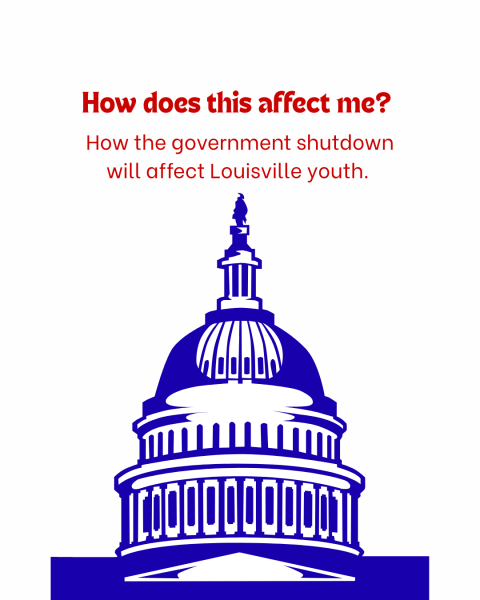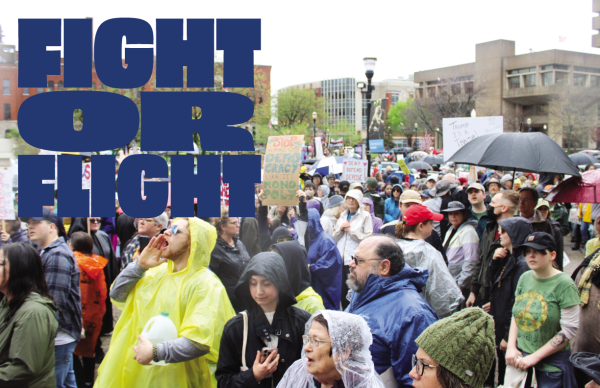United We Stand
In times of political division, unity is more important than ever.
Photos by Ysa Leon
Lily Wobbe stands looking up at artwork in Louisville. In her editorial “United We Stand,” she grapples with the divide between Kentucky and Louisville.
I’m from Louisville. No, not Kentucky. Louisville.”
Hearing this all-too-familiar conversation, especially among my peers, breaks my heart. Maybe it’s because they grew up in the city, feel more connected to Kentucky’s northern counterparts, or haven’t grown to appreciate the rest of the commonwealth; regardless, the divide between city and state runs much deeper than the rolling bluegrass hills.
I must admit, I was one of those people, and not too long ago. Just like so many other young people, I grew up in Louisville with an overwhelmingly urban mindset. I got used to having a city in my backyard and I took the opportunities it gave me for granted. Louisville seemed to turn a cold shoulder to the rest of the state, which to me, made it feel distant and disconnected. But more importantly, I saw Kentucky as a place that held me back rather than one I could grow in and truly call home.
Then, this summer, I was given the chance to travel the state on a week-long service trip. At first, the idea sounded crazy — I’d lived my whole life in Louisville. Why would I want to spend my summer driving through the cornfields of rural Kentucky?
My preconceived notions of our state, outside of my hometown, got me thinking. Why does Louisville, the most prominent and influential city in Kentucky, seem so separate from it?
Politics.
It’s a complex and intertwined issue, but politics is one of the biggest causes. Look at any map of Kentucky’s political parties and you’ll see a wave of red counties dotted by the occasional blue, Louisville being the largest. In a country divided along partisan lines, it’s no surprise that they seem to divide Kentucky’s people as well.
Louisville native John McCarthy is the founder of McCarthy Strategic Solutions and is one of Kentucky’s top-paid lobbyists. According to him, the disconnect all comes down to legislation.
“The divide usually comes in decision-making in the legislative process about where you spread resources,” McCarthy said.
This makes sense when you consider Kentucky’s political makeup. Naturally, Louisville’s state legislators advocate for more Democratic policies since Louisville is more Democratic, and vice versa. Because of these political divisions, it becomes increasingly difficult for Louisville’s policymakers to cooperate with each other, furthering the political divide.
For example, gun control is a heavily politicized issue, with Democrats usually voting in favor of tighter restrictions and Republicans usually voting against. Kentucky is no exception.
“Gun violence is a topic that’s very important to the Jefferson County delegation, where the rest of the state doesn’t view guns as the issue. They view the people that are using the guns as the issue. And that’s just a difference on one policy,” McCarthy said.
Money also plays a huge role in the divide.
“Everyone wants money spent in their area, so the difference comes in what sort of things you want it spent on,” he said. “Out in the rest of state, they’re used to doing more with less.”
Similarly, people from Louisville are more likely to advocate for government spending on infrastructure and urban development. In Kentucky’s more rural areas, however, people tend to need agricultural subsidies. This only increases the divide since it requires lawmakers to heavily advocate for their own counties rather than consider the collective good of the state. While disagreement on finance is normal and occurs all the way up to the federal government, it can be especially isolating on the state level because it’s a much smaller governing body.
While the rest of the state’s financial income is important, it’s important to mention that Louisville’s massive contribution in the form of tax revenue is also vital to the success of the entire state. Jefferson County, which includes Louisville, generates millions of dollars in income tax that is distributed throughout the other counties. Without that funding, the rest of the state would struggle to raise funds for education, healthcare, and other important services.
“The rest of the state knows the economic benefit we have with a strong Louisville. It helps everybody,” McCarthy said.
In the most recent election, a slim, yet powerful, majority of the state voted for Andy Beshear in the gubernatorial race, replacing incumbent Matt Bevin. Although Kentucky has historically had many more Democratic governors — a five to one ratio since 1931 — many young people only remember a Republican Kentucky and saw Beshear’s win as a shock.
From a national standpoint, Kentucky’s switch to a Democratic governor in this recent election is also surprising since the state has the reputation of being deep red. Electing Beshear goes against the Republican stereotype that people assign the state. Despite Kentucky’s Democratic past, however, those on the national level might wonder why a bunch of gunslinging, bourbon-drinking, horse racers elected a Democratic governor.
So Democratic governors in Kentucky are anything but new. This year, however, Andy Beshear was the only Democrat elected to a top state office — a stark difference from the other five Republican winning candidates sharing his ballot. The election makes it clear that Kentuckians aren’t voting straight-ticket.
Some voters, however, only voted for Beshear out of rejection for Bevin. To many, Beshear was just the lesser of two evils. Even still, his win shows that Kentucky voters have the power to create change in the commonwealth if they don’t like what its leaders do.
On both the state and national level, it is imperative to look at the candidates closely and make decisions based on their integrity and disposition instead of just their party. Seeing Kentuckians vote for Beshear gives me hope for the state. It isn’t based off of his policies or political affiliation, but because our state’s voters are taking initiative and researching candidates before they cast their votes. This is essential to a healthy democracy and Kentucky is showing incredible amounts of promise.
Another rift exists because of our state’s geography. To southern states, Kentucky seems more northern, whereas to the north, we embody the south. Within the state, this separation is visible, too. Urban regions of Kentucky, like Louisville, connect more with the industrial north, whereas more rural parts identify more closely with the agricultural south.
This is more of a cultural difference, and it’s noticeable in things as simple as the perception of accents across the state. Kentuckians from Louisville and other urban areas perceive rural Kentuckians to have southern accents, while those people might not consider themselves to have an accent at all. The same is true the other way around. It’s a different type of divide, but it only contributes to the feeling of separation in the state.
Communication and cooperation are critical now more than ever. In a nation as polarized as ours, it’s more and more important to bridge the divide and work for the common good — for the commonwealth.
Aside from politics, Kentucky is often overlooked by larger, more popular states. Some people summarize Kentucky as horses, bourbon, and basketball, but there’s so much more to be proud of.
“A lot of people try to discount Kentucky based off of stereotypes, but Kentucky is actually a pretty cool place to live,” said Abbie Turner, a high school senior from Georgetown.
Although she lives close to Lexington, one of Kentucky’s biggest cities, Turner wishes the state was more cohesive as a whole. If Kentuckians were more cooperative both socially and politically, perhaps our reputation would be closer to improving.
Some people from outside of Kentucky can’t look past its negative stereotypes, but proud Kentuckians are able to see its true beauty in their everyday lives. A short drive down Bardstown Road or a walk through one of Kentucky’s 46 state parks should be enough to remind any Kentuckian that our state is vibrant and beautiful.
Turner has a lot of pride in her state, but also in her city. Sometimes, she feels like Louisville is given a lot of credit when Kentucky’s smaller cities work just as hard. Louisvillians shouldn’t be the only ones allowed to be proud of their city.
Haley Comstock, a high school junior from Owensboro, also stressed the importance of representing Kentucky positively as much as possible. With stereotypes more prevalent than ever, Kentucky residents represent the state even when they’re away from it.
Since Kentucky isn’t a center for international business to the extent of New York or California and doesn’t have a massive tourism industry like Florida or Texas, it can be easily dismissed. In order to fight those misconceptions and give Kentucky the positive reputation it deserves, we should think carefully about how we represent our state at all times.
“You have to take into consideration that it’s your own state, and that’s what you represent,” Comstock said.
Additionally, we have to stop taking things for granted. Louisvillians take ease of access to the city for granted since we live fairly close to almost everything we need. It’s easy to forget that the majority of the state doesn’t live a mere 10 minutes from a wide variety of businesses, restaurants, and places of recreation. This doesn’t just apply to Louisvillians, though. From the mountains in the east to the rolling fields of the west, we all have the tendency to forget how unique our own regions are. For Riley Gillam, an eleventh grader from Pikeville, seeing mountains on a daily basis is custom.
“This is what our backyards look like. I didn’t realize how gorgeous and how great it was, because I’ve grown up around it and it’s all I’ve ever known,” she said.
So, this summer, I decided to go on the trip that I’d been uncertain about for so long, and I’m so glad I did.
On my trip, I got to meet people from all around the state, including the three quoted in this story, all while getting to explore their hometowns and learn about their unique cultures. In Murray, I met college students at Murray State University and learned about their student journalism organizations. In Owensboro, I volunteered with Habitat for Humanity and met families in need who had been given shelter by the organization. At the Cumberland Gap, I hiked in one of Kentucky’s stunning state parks and got to appreciate our state’s natural beauty.
More than anything, I learned just how diverse Kentucky’s culture is. Not only is Louisville unique, but every place in our state is. Instead of letting those differences divide us, we should celebrate them. In the end, our differences shouldn’t make Kentucky divided. They should make us united.
Donations are collected through The Publishers, duPont Manual High School's booster club for J&C. On The Record relies completely on sponsorships, advertisements, and donations to produce and distribute each issue. Please consider donating to our cause, and helping the student journalists of OTR amplify youth voices for years to come.








